PPC Management for Small Businesses: Tips and Tricks
Table of Contents
The Basics: What is Local Business PPC?
How Can PPC Help Your Business?
Ads.
Powerful, concise, and conversion-oriented ads have the power to turn casual web browsers into loyal customers.
If they reach them, that is.
If you chop up all the classic ingredients of advertising and chuck ‘em into a blender, the result will disappoint you.
In 2022, conventional advertising won’t get you anywhere. If you want your ads to reach and convert your target audience, you have to think smart.
PPC advertising is the new and improved way of doing ads in 2022.
Hearing of it for the first time?
Don’t worry; we’ll cover everything in this blog.
What is local business PPC? How can PPC help your business? How can you get started with PPC management for small businesses?
Buckle up; it’s time to get your advertising strategy back in shape!
Let’s kick things off with smart PPC management. Fill out the form below for a free proposal!
The Basics: What is Local Business PPC?
PPC (pay-per-click) is an advanced advertising model that fetches a fee from advertisers each time someone clicks on their ads.
It works in three simple steps:
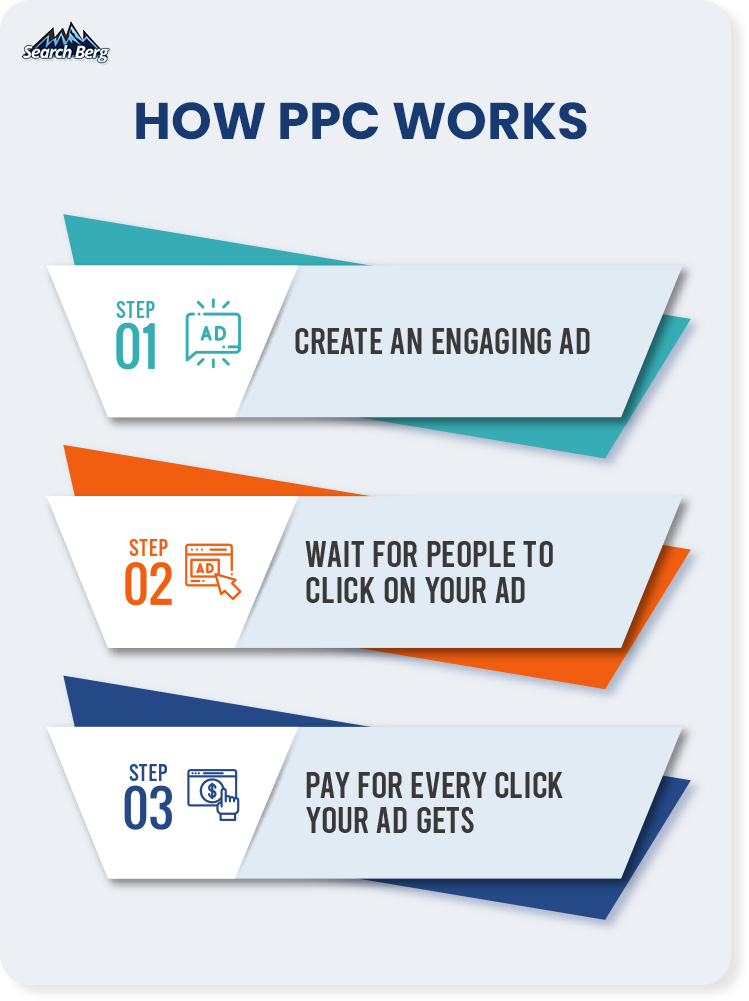
What makes this so great?
For starters, it’s a guaranteed way to earn clicks and conversions.
You’re not paying for ads that float around the web and never make it to your audience; you’re only paying each time you actually earn a visit.
There are many different types of PPC advertising: paid search marketing, social media advertising, affiliate marketing, display marketing, and so on.
Irrespective of the strategy, the concept is the same: paying for what you get, not paying for what you may get.
Here’s a quick example of search engine PPC for small biz.
When you search for “tech support in Atlanta”, you get the following search results:
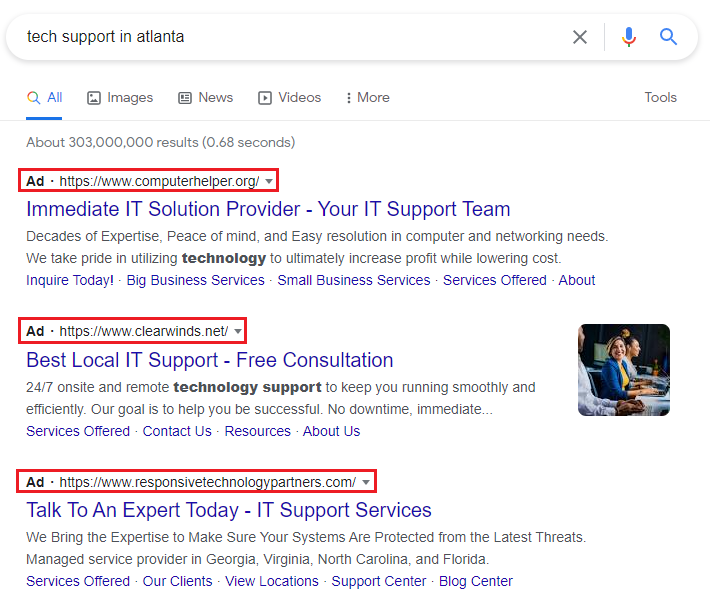
These are all paid ads.
Effective PPC advertising helps you rank among the top Google search results.
The outcome? Better reach, a nice stream of traffic, and more conversions.
Sounds like something your small business needs?
You’re on the right track.
Local business PPC takes things to a whole different level.
Instead of paying for ads that show up all over the place, you’re only paying for ads that appear to your target audience, wherever they are.
Think about it.
What’s the point of your ads showing up on web browsers in California when your products/services are exclusively available in Texas?
It kind of defeats the purpose, doesn’t it?
By localizing your PPC advertising efforts, you earn more sales.
How Can PPC Help Your Business?
Sniff sniff… smells like better rankings!
PPC helps you reach your business goals.
Instead of dilly-dallying around the web, your ads actually have a powerful impact.
Compared to other forms of advertising, PPC is measurable and trackable. There’s greater accountability, so you don’t have to pay for anything that’s not benefiting you.
This is a great way to save money on exorbitant advertising costs as a small business.
Remember, you’re just starting off.
You can’t afford to waste a big chunk of your revenue on advertising strategies that don’t have much yield.
PPC advertising helps you squeeze every drop of conversion juice out of your ads.
Support different parts of your sales funnel and earn spectacular sales that improve your bottom line and credibility.
Is PPC Expensive?
It might seem that way, right?
In actuality, PPC is the poster child for cost-effective advertising.
The fee for each ad is trivial. If you pay $2 for a click and earn $200 in return through a sale, you’re making a sweet profit.
PPC is the smartest way to put your business out there and leave with a pocketful of pretty earnings.
Getting Started with PPC Management for Small Businesses
1. Identify the Right Keywords
PPC marketing is all about getting the keywords just right.
Think about it. Thousands of businesses are making the most of this neat strategy.
Thousands.
How will your ad appear on top when so many other brands do the same thing?
SEO always makes its way to every advertising approach, including PPC for small biz.
You have to optimize your ads to get them on top.
Keyword research is the first step to earning higher PPC ROI.
If you haven’t already, create a keyword strategy based on your industry, audience, products/services, and the location you’re targeting.
If you skip this step, you’ll struggle to earn quality leads.
Make sure you change the keywords every month.
This is imperative.
With time, every industry evolves.
Audience interests change.
Region-based preferences transform.
As you tweak your keywords, you’ll stay on top of these changes.
Choose relevant, high-ranking keywords that help you rank. At the same time, make a list of negative keywords.
This little trick will help you avoid ranking for certain phrases.
What do we mean by this?
Let’s say you sell sunglasses. If a web user searches for “wine glasses” or “drinking glasses”, your business should not show up among the search results.
Work with a team of keyword experts to make your negative keyword list as comprehensive as possible.
Are your keywords in bad shape? Yikes. Let our keyword experts undo the damage! Fill out the form below for a free proposal.
2. Choose the Right Platform
Many advertisers launch PPC management campaigns that fall flat on their faces.
Why?
You cannot copy-paste strategies. What works for another business may very well not work for you.
When it comes to effective PPC advertising, there’s no such thing as a glittering one-size-fits-all strategy.
Instead of grabbing something off the shelf, create your own unique campaign.
You can choose between many different platforms.
Find one that’s just right for your industry, audience, and location.
This will help you drive targeted traffic and earn clicks from web browsers who can actually buy your stuff!
Here’s your go-to PPC advertising cheat sheet:
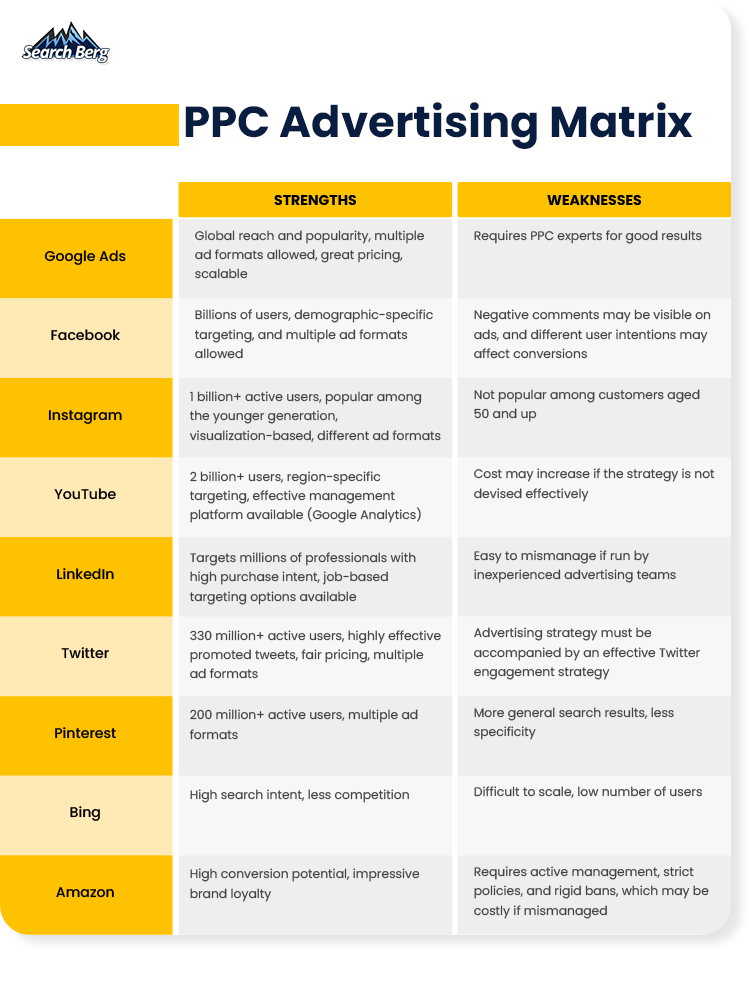
When in doubt, start with Google.
The most popular and used platform, Google, will help you earn more clicks and conversions.
Kick things off with Google Adwords, Google’s trusty PPC advertising platform.
This is the standard platform for just about every small business.
Once you launch a Google Ads campaign, follow it up with more specific campaigns.
You’ll have to speak with a team of PPC professionals to determine which sub-platforms are right for your business.
If you sell fashion clothing, your ads must be displayed on Facebook, Instagram, and Pinterest.
For businesses that offer tech support, Facebook and YouTube are great starting points.
And if you sell bedding online, Amazon should be your go-to advertising platform.
Of course, the strategy will ultimately vary based on the specifics.
Find a team of professionals who can do justice to your advertising plans!
Recommended Read: PPC B2B Lead Generation: Getting the Best Out of Your B2B PPC Agency
3. Test, Test, Test!
Stellar advertising rests on the shoulders of A/B testing.
No matter how great you think your PPC ads may be, it’s possible that they don’t resonate with your audience.
Or perhaps you’re dealing with a case of analysis paralysis and can’t figure out which design you should approve.
A/B testing helps you test different variations of your ads and figure out which design is the most effective.
Your PPC campaign will backfire if you skip this.
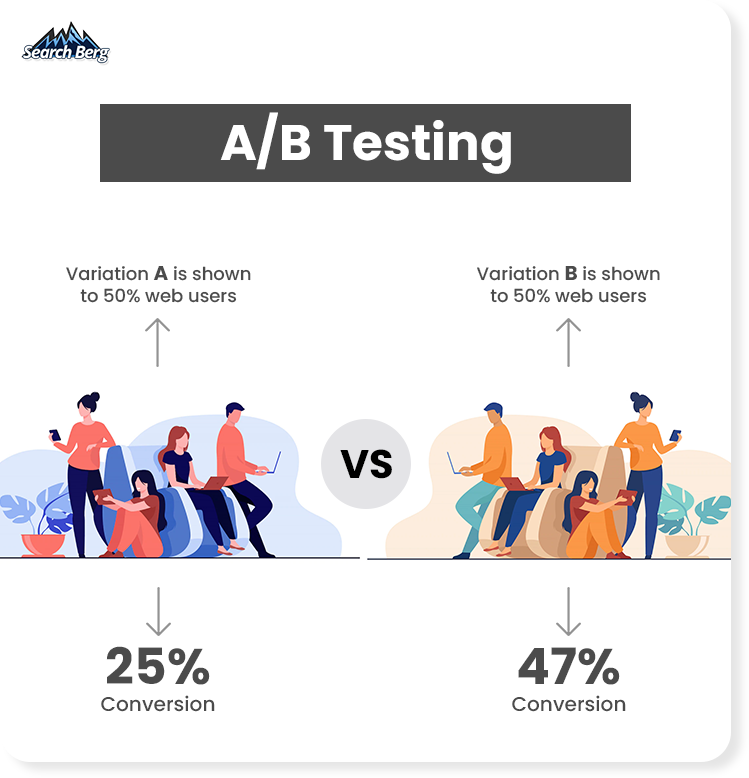
Web users will not click on your ads if the content, design, font, color scheme, or any other component is off-putting.
Launch different versions of the same ad and see what your audience likes better.
If you don’t want to officially put things to the test, find a pool of your audience that’s willing to participate.
Experimentation will ultimately help you launch effective, visually compelling, clean, and engaging ads that do exactly what they’re meant to do: convert.
4. Don’t Exceed Your Budget
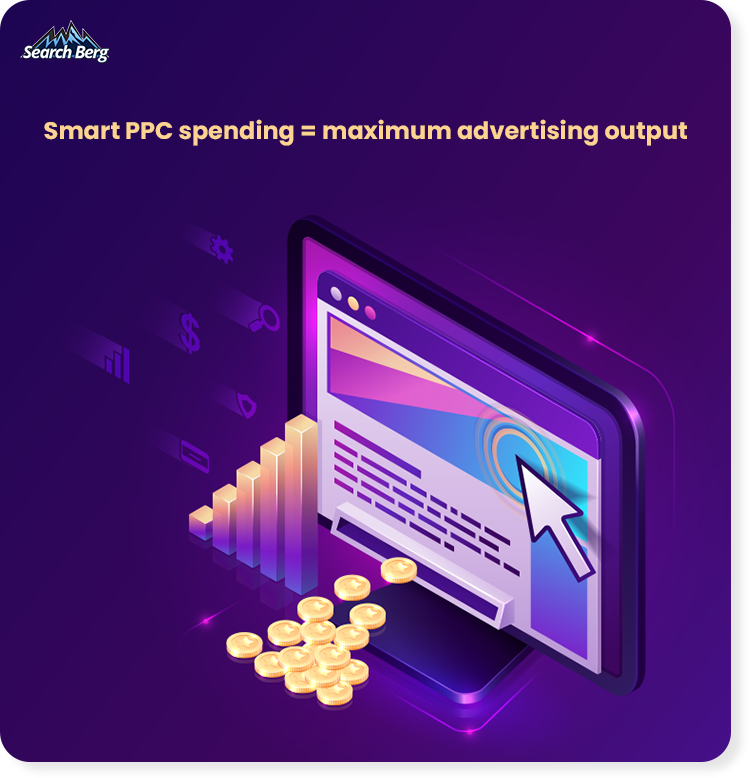
When starting off with PPC management for small businesses, advertisers often get carried away.
PPC advertising is effective and powerful.
But this doesn’t mean that you put all your eggs in one basket, especially if it’s a poorly constructed basket.
Partnering with the wrong company and exceeding your budget is a common advertising faux pas.
Avoid it at all costs.
For starters, find a company that has a stellar reputation. They should have extensive experience in creating top-notch PPC campaigns that don’t just look pretty but actually work well.
Found the one?
Create a campaign budget before you kick things off.
Don’t exceed the limit.
Starting off slow is the best way to achieve good results.
As your strategy starts proving its efficacy, you can select a bigger plan over time.
But avoid going all out right off the bat.
5. Be Creative
As you manage your PPC campaign, make sure you develop a knack for sniffing out boredom if it ever seeps through the cracks.
No matter how visually appealing your ad may be, boring language will steal conversions from you at lightning speed.
Good ad copy immediately grabs people’s attention.
It’s exciting!
Carefully and continually analyze your campaign to ensure that the language is strong, effective, and conversion-oriented.
Avoid cheesy, wishy-washy catchphrases and opt for dynamic headlines that convert your target audience.
PPC management doesn’t just include the technicalities. In fact, it also takes content and design into account.
Keep this in mind so you can make the right adjustments to your campaign and yield powerful results.
Recommended Read: How to Brainstorm and Write Marketing Copy to Convert More Users
6. Understand Your Competition
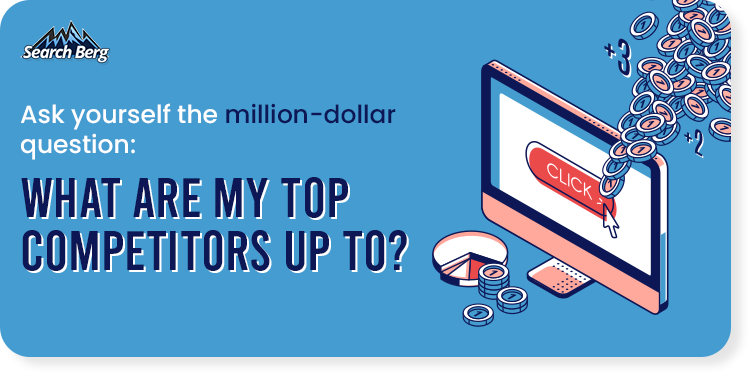
Keywords are fueled by competition.
You’re ranking for them, and your competitors are ranking for them. Perhaps even your grandma is ranking for them!
We joke. But you get the point.
PPC marketing is competitive by nature.
As you start managing your campaign, keep the heated competition in mind.
As your competitors overtake you, their ads will replace yours. This happens in every industry, especially those with high product/service demand.
Keep customizing and optimizing your ads to stay ahead of the curve.
Your ads should be unique and exciting. They should also appear across the right platforms in the right manner.
If you’re unsure about these specificities, take a peek at what your top competitors are doing.
What does their PPC advertising campaign look like?
Which platforms have they targeted?
Which ad formats are they using?
What is their ad language like?
What’s special about the designs?
Track all the metrics you can get a hand on.
Remember, there’s a reason why they’re doing so well. As you’re let in on the secret, you can use similar strategies to reach the same rung of the ladder and eventually get ahead.
Avoid copying your competition. Instead, use their PPC ad strategy as inspiration.
Understand the groundwork that needs to be laid to get similar results. When done right, comprehensive competitor analysis will help your ads bag more conversions.
7. Monitor, Track, and Repeat
Done and dusted?
Not quite.
If you want your local business PPC campaign to yield stellar results, keep a close eye on your performance.
How are your ads doing across different platforms?
What’s going wrong? How can you fix it?
Should you add new techniques to the mix?
Which approach is yielding the best results?
Are there any gaps you need to fill?
Monitor and track everything so you can stay on track through and through, continually improve, and grow your business.
We also recommend creating a PPC mitigation and contingency plan (ask our PPC experts about this).
When your campaign is adequately backed up, you’ll be able to roll out a whip-smart action plan in case something goes wrong.
Excellent preparation and even better action will help your ads rank and convert!
And the Ball Lands in Your Court
We’ve laid out the cards. It’s time for you to grab ‘em and leverage ‘em!
In this blog, we walked you through seven essential tips for effective PPC management for small businesses.
We covered the importance of creating a kickass local business PPC campaign. We also answered one of the most commonly asked questions among small businesses: how can PPC help your business?
Now that you have a good grasp of why PPC is so important and how it works, it’s time to kick things off!
At Search Berg, we offer professional PPC management services.
Our team will help you boost sales, lower costs, and track key PPC metrics.
We take care of everything.
Our pros will optimize your ad spending, monitor your campaign 24/7, provide weekly and monthly reports, and provide dedicated support.
It’s time to clean up your advertising act with Search Berg.












